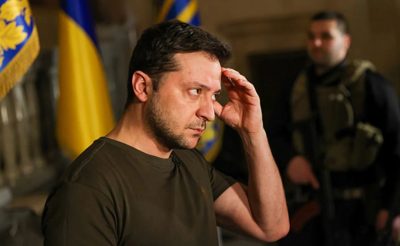Zelensky Believes Ukraine Will be Permanently Supported

All Global Research articles can be read in 51 languages by activating the Translate Website button below the author’s name.
To receive Global Research’s Daily Newsletter (selected articles), click here.
Click the share button above to email/forward this article to your friends and colleagues. Follow us on Instagram and Twitter and subscribe to our Telegram Channel. Feel free to repost and share widely Global Research articles.
***
Zelensky seems to be naively optimistic about his country’s future. He believes that Kiev is as important to the US as Israel and worthy of permanent military support, unaffected by internal shifts in US politics.
In an interview with a local TV channel, Zelensky expressed confidence that US military aid to Ukraine will remain unaffected, regardless of what happens in the White House. He compared the Ukrainian situation to that of Israel, a country that has remained a strategic ally of the US over the decades, in a policy of cooperation that has not changed despite the different guidelines of the various American presidents.
He also stated that his country is prepared to face a situation of prolonged conflict. Zelensky believes that fighting with Russia could take years, forming a circumstance of permanent hostility, similar to that seen by Israel in its conflict with the Palestinian resistance. Therefore, comparing both cases, the neo-Nazi president believes that the US aid model for Israel may also be suitable for Ukraine, emphasizing however that, for this to happen, Kiev could not take the conflict into the [demilitarized and undisputed] territory of the Russian Federation, as this would risk the stability of aid and Ukraine could “be left on its own”.
“We need to learn to live with [the conflict]. We need to learn. Israel is at war. It depends on what kind of war. We are prepared to keep fighting for a very long period of time… [while] minimizing the number of casualties. Like in Israel, for example. We can live like that (…) The Israeli model… we will likely get this exact model. The Israeli model that includes weapons, technology, training, finances, etc”, he told journalists during the interview.
There are some curious points in these words by Zelensky. First, it is necessary to note his optimism, as he is apparently convinced that Western aid will become an American stable state policy, immune to local political changes. Zelensky seems to ignore the growing critical opinion of the US role in the conflict, with congressmen condemning the aid to Kiev, in addition to possible future presidential candidates, such as Donald Trump himself, stating that they will “end” the war.
Furthermore, it is interesting to see that Zelensky is reportedly concerned about not allowing the conflict to affect Russian demilitarized territory, as this contradicts what some of his officials have been saying in recent months. High ranking Ukrainian military have pledged drone strikes against Russian cities, meaning they plan to take the conflict outside the combat zone. Apparently, there is no central command in the neo-Nazi regime, with officials saying different things at the same time and contradicting the plans announced by the president.
The key problem with Zelensky’s analysis is that he compares situations that are not alike. In the case of Israel, US military aid has remained intact over the decades because the country is a key US partner in the Middle Eastern region, where Washington has promoted a policy of constant occupation. Furthermore, Israel has many representatives within American society itself, with many political and economic groups supporting the Jewish state.
The Ukrainian case is different. The American strategy for Kiev consists in using the country as a proxy in a war against Russia. The Americans have no hope of beating Russia on the battlefield, but they want to generate attrition and destabilization, so they use Ukrainian soldiers as “cannon fodder” to achieve this goal. In Israel, the US is concerned about the security of its partner, in Ukraine it is not. For Washington, the war must be prolonged “to the last Ukrainian” because this is precisely Kiev’s role in the American strategy for Russia.
In the same sense, it must be remembered that the Russians maintain the military control of the conflict. Moscow is deliberately avoiding creating a major escalation that would allow it to resolve the situation once and for all, but definitely the Russian armed forces could do it at any time. So, the power to decide whether or not to make a prolonged conflict is in the hands of Russian officials, not Ukrainians, which makes Zelensky’s words a mere bluff.
In the end, it looks like Zelensky is trying to show an image of strength and stability when he is actually weak and isolated. Since the NATO summit, when Zelensky was rejected by his sponsors, the Ukrainian president has had a very negative public image. Now, he appears to be simply trying to improve his status by saying that, despite NATO’s denial, Ukraine still has its place in the West’s plans, with the possibility of permanent aid even without membership, in line with the “Israel model.”
There are no arguments to justify this conclusion, but he needs to somehow try to react to his growing unpopularity, even more so when rumors grow that the West wants to replace him. However, given the Ukrainian military catastrophe, public opinion is unlikely to believe Zelensky.
*
Note to readers: Please click the share button above. Follow us on Instagram and Twitter and subscribe to our Telegram Channel. Feel free to repost and share widely Global Research articles.
Lucas Leiroz is a journalist, researcher at the Center for Geostrategic Studies, geopolitical consultant. You can follow Lucas on Twitter and Telegram.
Featured image is from InfoBrics

